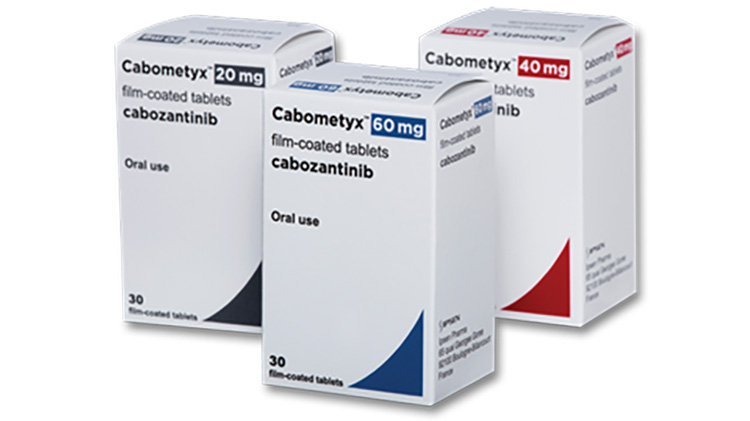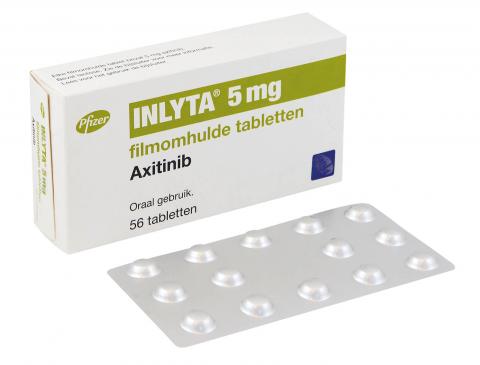Cabometyx (cabozantinib) vs Inlyta (axitinib)
Cabometyx (cabozantinib) vs Inlyta (axitinib)
Cabometyx (cabozantinib) and Inlyta (axitinib) are both oral medications used in the treatment of advanced renal cell carcinoma (RCC), but they differ in their mechanisms of action and side effect profiles. Cabometyx targets multiple tyrosine kinases, including MET, VEGFR, and AXL, which can lead to a broader range of anti-tumor activity, but may also result in a wider array of potential side effects such as diarrhea, fatigue, and hand-foot syndrome. In contrast, Inlyta is more selective for VEGFR, which may result in a different side effect profile, potentially including hypertension and fatigue, and could be preferred based on the individual's specific health condition and tolerance to medication side effects. It is important for patients to consult with their healthcare provider to determine which medication is most appropriate for their individual case, considering factors such as previous treatments, current health status, and potential drug interactions.
Difference between Cabometyx and Inlyta
| Metric | Cabometyx (cabozantinib) | Inlyta (axitinib) |
|---|---|---|
| Generic name | Cabozantinib | Axitinib |
| Indications | Renal cell carcinoma, hepatocellular carcinoma, medullary thyroid cancer | Renal cell carcinoma |
| Mechanism of action | Tyrosine kinase inhibitor | Tyrosine kinase inhibitor |
| Brand names | Cabometyx, Cometriq | Inlyta |
| Administrative route | Oral | Oral |
| Side effects | Diarrhea, fatigue, nausea, decreased appetite, hypertension, etc. | Diarrhea, hypertension, fatigue, nausea, dysphonia, etc. |
| Contraindications | Hypersensitivity to cabozantinib or any component of the formulation | Hypersensitivity to axitinib or any component of the formulation |
| Drug class | Tyrosine kinase inhibitor | Tyrosine kinase inhibitor |
| Manufacturer | Exelixis, Inc. | Pfizer Inc. |
Efficacy
Cabometyx (Cabozantinib) Efficacy in Kidney Cancer
Cabometyx, the brand name for cabozantinib, is a medication that has been approved for the treatment of advanced renal cell carcinoma (RCC), which is the most common type of kidney cancer. The efficacy of Cabometyx in treating RCC was demonstrated in a pivotal phase III clinical trial known as METEOR. The trial showed that Cabometyx significantly improved progression-free survival compared to the standard treatment at the time, everolimus. Patients treated with Cabometyx had a median progression-free survival of 7.4 months compared to 3.8 months for those on everolimus. Additionally, Cabometyx showed an improvement in overall survival and a higher objective response rate, meaning more patients experienced a reduction in tumor size.
Inlyta (Axitinib) Efficacy in Kidney Cancer
Inlyta, or axitinib, is another targeted therapy approved for the treatment of advanced RCC after failure of one prior systemic therapy. Axitinib works by inhibiting vascular endothelial growth factor receptors (VEGFR), which play a role in tumor growth and angiogenesis. The efficacy of Inlyta in kidney cancer was established in the AXIS trial, a phase III study comparing axitinib to sorafenib in patients with advanced RCC who had failed one prior therapy. The results showed that axitinib significantly extended progression-free survival with a median of 6.7 months compared to 4.7 months for sorafenib. The response rate was also higher with axitinib, indicating a greater proportion of patients experienced tumor shrinkage.
Combination Therapy in Kidney Cancer
Recent studies have also explored the use of combination therapies involving Cabometyx and Inlyta for the treatment of advanced RCC. The CheckMate 9ER trial, for instance, evaluated the combination of Cabometyx and the immunotherapy drug nivolumab versus sunitinib alone in previously untreated advanced RCC. The combination therapy showed a significant improvement in progression-free survival, overall survival, and objective response rate compared to sunitinib, setting a new standard for first-line treatment of advanced RCC. This combination has been approved by regulatory agencies and offers a new effective treatment option for patients with kidney cancer.
Conclusion
Both Cabometyx and Inlyta have demonstrated significant efficacy in the treatment of advanced renal cell carcinoma. These medications offer hope for patients with this type of kidney cancer, particularly when used in combination with other therapies such as immunotherapy. As treatment paradigms evolve, the role of these targeted therapies continues to be refined, with ongoing research aimed at improving outcomes for patients with RCC.
Regulatory Agency Approvals
Cabometyx
-
European Medical Agency (EMA), European Union

-
Food and Drug Administration (FDA), USA

-
Health Canada

-
Therapeutic Goods Administration (TGA), Australia

Inlyta
-
European Medical Agency (EMA), European Union

-
Food and Drug Administration (FDA), USA

Access Cabometyx or Inlyta today
If Cabometyx or Inlyta are not approved or available in your country (e.g. due to supply issues), you can access them via Everyone.org.
How it works

Make an enquiry
Choose the medicine you want to buy, answer a couple of questions, and upload your prescription to speed things up. We’ll get back to you within 24 hours.


Make an enquiry
Choose the medicine you want to buy, answer a couple of questions, and upload your prescription to speed things up. We’ll get back to you within 24 hours.


Breeze through the paperwork
We'll guide you through the required documents for importing unapproved medicine, ensuring you have all the necessary information.


Get a personalized quote
We’ll prepare a quote for you, including medicine costs and any shipping, administrative, or import fees that may apply.


Receive your medicine
Accept the quote and we’ll handle the rest - sourcing and safely delivering your medicine.

Some text on this page has been automatically generated. Speak to your physician before you start a new treatment or medication.
Let's talk
If you have any questions, call us or send us a message through WhatsApp or email:
Contact us




